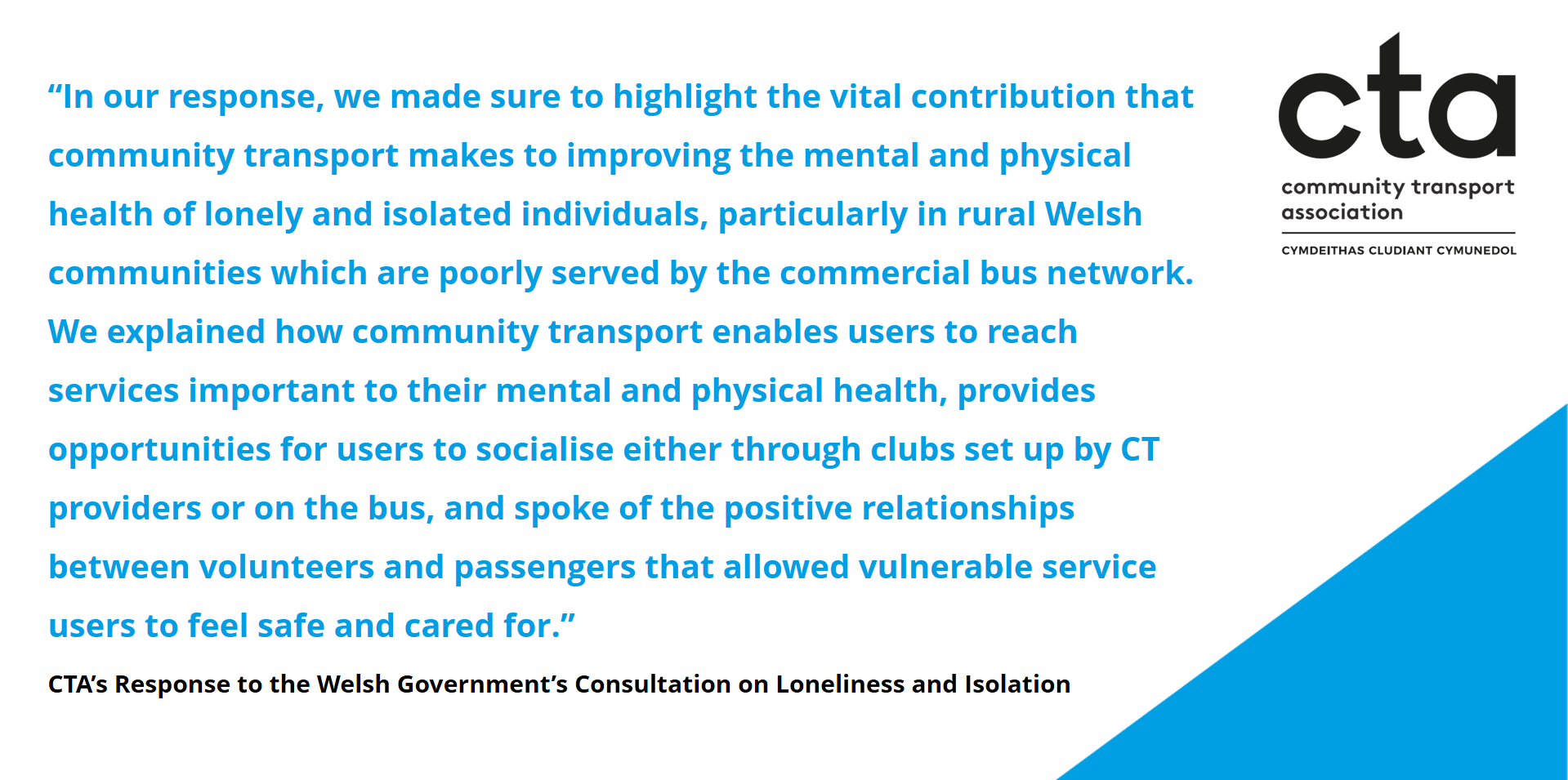-

CTA Respond to the Welsh Government’s Consultation on Loneliness and Social Isolation
-
21st January 2019
-
-
by Suzanne Lau
Policy Executive
The Welsh Government recently launched a consultation to inform their strategy on tackling loneliness and social isolation, which closed last week. Their paper (which you can read in full here) sets out their vision of a more connected Wales, provides definitions of loneliness and social isolation, shares evidence collected so far, current strategies, a suggested approach, and areas for further research. With the detrimental impact of loneliness and social isolation gaining traction in the media and political policy in recent years, the CTA greatly welcome the Welsh Government’s contribution to the conversation.
The consultation identifies several key areas that the Welsh Government envisages will have ‘the greatest potential contribution…to long-term prosperity and well-being’, of which two – mental health, and skills and employability – hold a direct link with community transport services.
The consultation proposes 23 questions and we tailored our response to the questions most relevant to community transport. We covered the provision of transport; the promotion of physical activity for lonely and isolated people; and the role of the Welsh Government, health services, employers and businesses, and the community in combatting loneliness and social isolation.
Community transport operators across Wales work with some of the most isolated communities in the country. Their footprint tends to be rural, and the demographic of service users tends to be older people and people with disabilities. As such, community transport is integral to enabling journeys for many lonely and isolated individuals to access vital services that are essential to their health and wellbeing.
In our response, we made sure to highlight the vital contribution that community transport makes to improving the mental and physical health of lonely and isolated individuals, particularly in rural Welsh communities which are poorly served by the commercial bus network. We explained how community transport enables users to reach services important to their mental and physical health, provides opportunities for users to socialise either through clubs set up by CT providers or on the bus, and spoke of the positive relationships between volunteers and passengers that allowed vulnerable passengers to feel safe and cared for.
Many loneliness projects are also reliant on community transport to enable their users to reach them, demonstrating how important it is for health agencies, social services and charities to collaborate with community transport operators when setting up projects. The role of Wheels to Work schemes and section 22 community bus services in enabling people to take advantage of employment opportunities, and the benefits that this has on an individual’s sense of wellbeing, was also emphasised. Perhaps most importantly, we tried to underline the importance of supporting community solutions to loneliness and social isolation, demonstrating the way in which local people are best placed to remedy local issues, and how the potential impacts of these remedies could be far-reaching with the right assistance from relevant stakeholders and the Welsh Government.
On top of this, we issued several key recommendations to further improve transport provision and to support those services that community transport helps enable. We asked the Welsh Government to:
- Expand funding opportunities, citing the projects made possible by the Connecting Communities in Wales project, and the Community Minibus Fund, the latter of which can be replicated in Wales.
- Facilitate voluntary work – by providing discounted/free parking for volunteer drivers and specialist parking and set-down points for community minibuses to enable community transport operators to better assist passengers closer to their destinations.
- Improve commissioning practices to make them community-led, multi-modal, accessible and inclusive.
- Develop an impact framework so that community transport providers can demonstrate the impact that they have on the prevention of ill-health, which would subsequently encourage financial support and ties with health bodies and local authorities.
- Ensure that transport is considered a key requirement during the planning process of loneliness and isolation projects.
- Ask employers and businesses to encourage volunteering within their workforce, fund Wheels to Work schemes, and provide spaces that can be leveraged for community use.
To read our full submission, please click here.
-
-
- About CTA
- /
- CTA Membership
- /
- CTWeek24
- /
- Policy & Research
- CommunitySolutions: A Manifesto for the Next UK General Election
- Our Campaigning Guide for Community Transport
- Our Policy Work
- Join Our Mapping England Passenger Survey
- Aneurin Bevan Transport to Health
- Climate Action in Scotland
- conneCTing England Programme
- Mapping Scotland Project
- Mapping Wales
- Mapping England
- Tackling Loneliness in England
- Healthy Communities in Scotland
- /
- Advice & Support
- /
- Training
- /
- Events
- /
